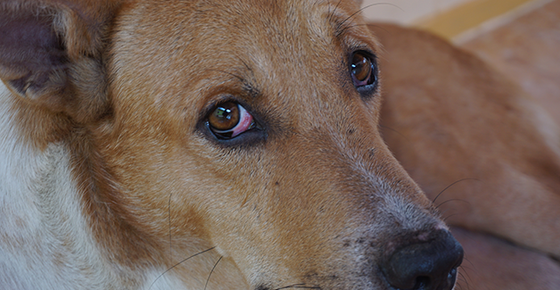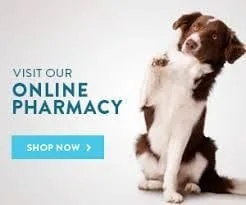
Dogs occasionally develop a red eye. The redness may be in the white of the eye, in the clear part of the eye called the cornea, or within the eyeball. There are many causes of a red eye, but all ocular diseases should always be considered an urgent matter, and be checked immediately by a veterinarian.
Evaluation
A dog owner will typically be asked to describe the pet’s medical history, symptoms, and if there were any pertinent events prior to the development of the red eye, such as injury or illness. The veterinarian will perform a complete physical exam on any dog that has a red eye to look for any other abnormalities that may give a hint as to their cause. The veterinarian will then concentrate on the eyes. There are three basic ophthalmic tests: a Schirmer test, tonometry, and fluorescein staining.
A Schirmer test measures tear production. Special paper strips are placed in each eye and it is noted how many millimeters of wetness the tears can form in 60 seconds. Too little tear production is called keratoconjuntivitis sicca (KCS) or "dry eye" is the common name. Tonometry is used to measure the pressure inside the dog’s eyes; increased pressure indicates glaucoma. Fluorescein staining checks for any scratch or interruption of the outside covering of the cornea. A positive stain indicates a corneal ulcer.
There are other tests that may be performed. The veterinarian may swab any pus draining from the dog’s eyes and send it to the laboratory for testing. Lab work, including a chemistry panel, a complete blood count, an electrolyte panel and a urinalysis may be performed to check for underlying diseases. An ultrasound of an eye may be done to check for a detached retina or masses within the eye or between the eye and the bony eye socket.
Diagnosis
A veterinarian diagnoses the cause of a dog’s red eye by assessing symptoms, medical history, physical examination, and laboratory testing. The most common causes of a red eye are a corneal ulcer, glaucoma, and conjunctivitis.
Corneal ulcers usually result from trauma such as running into a bush, fighting with other pets, or rubbing their eye. Ulcers are treated with topical antibiotics, and checked with fluorescein stain every few days until healed.
Glaucoma can occur in any dog, is sometimes related to other conditions such as cataracts, but is genetic in some breeds. Cocker Spaniels, terriers, Poodles, Basset Hounds, and Beagles are especially prone to this disease. Glaucoma can be very serious, it often leads to blindness. There are topical medications used to reduce the increased pressure.
Conjunctivitis can have many causes. Dry eye causes a conjunctivitis; this is treated with a topical medication that increases the amount of tears produced. Conjunctivitis can also be caused by bacterial infections, viral infections, or other irritants.
There are many other causes of a red eye: uveitis, orbital disease, bleeding disorders, trauma, luxated lens, etc. Your veterinarian can sort through all the possibilities and determine the appropriate treatment.
Sources:
American Kennel Club, Canine Health Foundation. "Canine Eye Health." November 2013.
Barfield Laminack, Elizabeth, DVM; Myrna, Kathern, DVM, MS; Moore, Phillip Anthony, DVM, Diplomate ACVO. “Clinical Approach to Canine Red Eye.” Today’s Veterinary Practice, May/June 2013.



